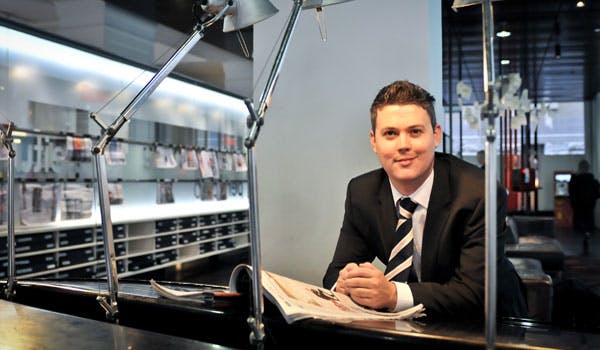“It’s getting exciting,” says Douglas Barton.
The youthful looking Mr Barton has good reason to be excited. His business, Elevate Education, has just won the 2014 NSW Telstra Business of the year. The business also took out the NSW small business category.
Elevate Education operates across four countries and holds study skills seminars attended by 175,000 seniors each year. It’s been a 13-year journey for Mr Barton who started the business in 2001 as a law-school student at Sydney University. His inspiration came after he realised the study skills he learned at high school did not adequately prepare him for the rigours of university life.
The now 34-year-old says he opted to leave university to start a business geared towards instilling high school students with the best possible study techniques to help them get ahead. It was a brave decision with Mr Barton and two close mates initially funding the start-up on their personal credit cards.
“I ended up leaving law school. I thought I’d give it a year and see what happens,” he said. “There wasn’t a big capital outlay and we were able to do it from the credit cards. The first four years were definitely slow.”
The approach taken by Elevate Education was to examine the techniques used by top performing students, break them down and pass on that knowledge to other students.
“We had a basic hunch that the guys who got the top results didn’t have higher IQs but that they did really specific things. We borrowed a concept really common in business of benchmarking and we basically started out doing a year’s research. We found 13 areas or different habits or skills that top students used.”
The research found the techniques most employed by top students were grounded in common sense. They included realistic goal setting, effective note taking, sound time management and exam preparation. But starting out was tough.
Mr Barton’s plan to employ university students to conduct study skills workshops hit a snag. University students are not qualified teachers and some schools were nervous at the prospect. “The obvious question we encountered was, “Are you guys teachers?” and the answer is ‘no’,” he says.
To get around this, Mr Barton realised he had to bridge the credibility gap to give his business a fighting chance. He believed that once schools had seen the seminars and the response of students, the concept would catch on. So he resorted to giving the study skills seminars for free.
“We went in and pitched the seminars and had our quoted price and in the end we basically started doing it for free,” he says. “Study skills isn’t an area that students necessarily get excited about. But because of the fact that we were young, we’d only just finished high school ourselves, we knew what would interest them.
“Then the word of mouth began to spread, it took probably four years to get enough momentum. At the same time though it’s probably something I wouldn’t change in hindsight… We really focused on developing the customer service ethos. Every single school was important.”
Elevate Education now works with about 1,000 schools across four countries, including Australia, the UK, South Africa and the United States. In Australia, there are roughly 675 to 700 schools, 250 schools in the United Kingdom, about 50 in South Australia and the first seminar in the United States will happen this September. Already about 10-15 schools have signed-up to the concept.
There fulltime team is comprised of seven people in the Australian office and six in the UK. However, there are close to 100 university age presenters working in Australia to deliver the study skills seminars. The average age of the presenters is 21 and their client retention rate runs at 90 per cent.
“It’s the perfect job for a uni student,” says Mr Barton. “Most of the presenters will do two days a week and fit it around their uni. It means they are also doing something they love doing.”
After a long journey, the business now appears to be at a tipping point where growth can increase rapidly. Revenue is forecast to double in the 2014-15 financial year.
“In terms of revenue at the moment it’s growing at 75 per cent across the company. We’re forecasting $6 million for this financial year… It’s getting exciting. You start pushing the snowflake down the mountain and it’s at that point now where it’s really got a life of its own.”
Mr Barton says the incentive for full time staff is the prospect of being able to open up in a new foreign market. “That kind of opportunity you don’t get in a larger corporate,” he says.
His advice to those who are starting out in business is not to do it for the money.
“Do something that you’ve got a vision or a belief in. If your primary motive is simply to make money, it’s very easy to quit when that isn’t happening. But if you’ve got a vision that’s greater than yourself, I think that’s where you have the ability to suffer out the hard times and persevere because you know there’s a value to contribute.”

